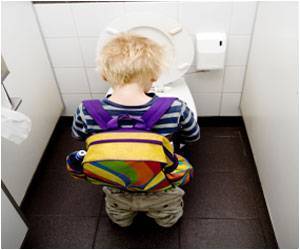As an effort to end open-air defecation for impoverished Indian women, 108 toilets, decorated with marigolds and ribbons, were unveiled in a tragedy-hit village.

"I believe no woman must lose her life just because she has to go out to defecate," said Bindeshwar Pathak, founder of sanitation charity Sulabh which built the toilets.
"Our aim is to provide a toilet to every household in the country in the not too distant future," Pathak told AFP in Katra Shahadatganj village.
The village made headlines around the world in May when the bodies of two schoolgirls were found hanging from a tree. They are thought to have gone out into the fields after dark because their home, like most in their district, lacked a toilet.
Police are investigating whether the cousins, aged 12 and 14, were gang-raped, although no one has been formally charged and five men initially accused are set to be released.
The incident sparked uproar in India, echoing the outrage over the fatal gang-rape of a student on a bus in New Delhi in 2012.
Advertisement
UNICEF estimates that almost 594 million -- or nearly 50 percent of India's population -- defecate in the open, with the situation acute in dirt-poor rural areas.
Advertisement
Modi raised the often taboo subject during his Independence Day speech in August, saying India should strive to ensure every household has a toilet within the next four years.
"We are in the 21st century and yet there is still no dignity for women as they have to go out in the open to defecate. Can you imagine the number of problems they have to face because of this?" Modi asked.
- Scared of attack -
Mother-of-three Dhanwati Devi, one of the villagers to receive a new toilet, said she could finally relieve herself without fear of being attacked in the dark.
"I used to dream my house will have a toilet one day. Now that I have one, I feel so proud and liberated," the 48-year-old told AFP, standing next to the blue and pink painted cubicle adorned with strings of flowers outside her home.
"I used to be so scared when going out in the deserted fields in the dark, because I could be attacked any time by depraved criminals," she said.
The uncle of the girls who were hanged said that for his family, the village's new toilets were symbols of both "hope and despair".
"Each time we see the toilets, we are reminded that our girls died because we didn't have one earlier," the uncle, who cannot be named for legal reasons, told AFP.
"But it also gives hope that our women will be safer now because they no longer have to venture out in darkness."
Successive governments across India, as well as charities and campaign groups, have long struggled to increase the number of toilets in villages and encourage their use. Experts say some households find defecating in the open more convenient, while others face plumbing, sewage and maintenance problems with their new latrines.
"Some people actually see open defecation as preferable to using toilets because of cultural, religious or traditional beliefs," said Zach White, a research officer at the non-profit organisation WaterAid.
"To many, the very idea of defecating in or nearby your own house, albeit in a toilet, is bizarre and seen as less hygienic than defecating on open ground away from where they live," White told AFP.
Lack of toilets and other sanitation issues costs India nearly $54 billion annually including through illnesses such as diarrhoea and lower productivity, a 2012 World Bank study found.
Workers from the Sulabh charity will now focus on educating villagers about improved sanitation and the health benefits of using toilets.
The women of Katra Shahadatganj, however, need no such encouragement.
"It's a luxury to be able to use the toilet when you need to," said Devi.
"Now that we have this luxury, we are not going to let it go to waste."
Source-AFP










